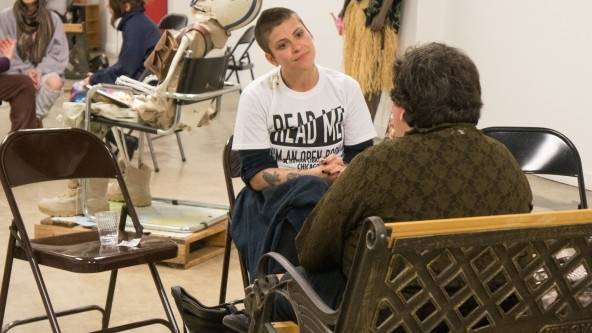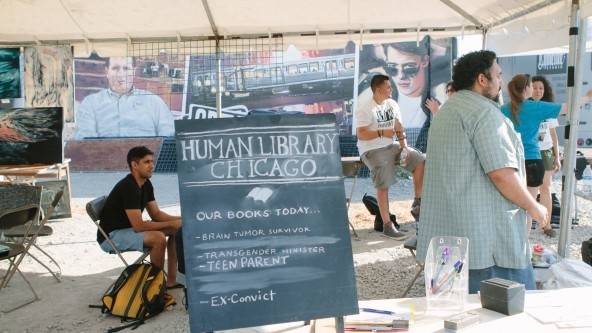Being a person is pretty hard sometimes. Being a good person is all the more difficult. Keeping an open mind, being willing to learn new things, and seeing from another’s perspective are already considerable challenges even when it’s not an election year. Thankfully, a beacon of hope and knowledge is coming to the 2016 Pygmalion Lit Fest in the form of the grandparent of Google: the library. At this library, though, people are the books. It’s actually even cooler than it sounds.
The Human Library is an organization focused on creating conversations that are meant to challenge stereotypes and chip away prejudice. To do this, individual volunteers sign up at Human Library events to be “books” that are loaned out to “readers,” who can be any member of the community organizing the event. During a reading, the book and reader have a one-on-one conversation in which the volunteer shares their personal experience being a certain “title.” These book titles are often marginalized groups or identities that are frequently misrepresented and misunderstood, with titles ranging from Refugee to Bipolar. The conversations can pair up any book with any fest-goer, resulting in an eye-opening interaction for both parties. According to the official website, Human Library events have been organized in more than 70 countries.
Sarah Christensen and Nisha Mody, co-organizers of the Human Library Champaign-Urbana Chapter, answered some questions we had about C-U’s latest library’s workings and collection.
Smile Politely: Could you tell us how someone becomes a book and how someone can become a reader? Are both positions open to anyone?
Human Library: Anyone can certainly be a reader, but our books are only those who have experienced prejudice due to issues such as race, sex, age, disability, sexual preference, gender identity, class, religion/belief, lifestyle choices or some other aspect of who they are. To find our books, we put out a call for participation through various student, campus, and community organizations for people who have an important story to share. Each of the books gave us some information about why they felt it was important for people to hear their story, and we then spoke with them all individually about their applications to make sure their participation would be productive for everyone involved at the event. To become a reader, you just need to show up at the event and check out a book! However, our emphasis throughout the planning process and at the event is to create a safe space for everyone to engage in a productive dialogue, and so both our books and readers should demonstrate mutual respect in that they are not debating each other’s experiences or using offensive language.

SP: What kinds of people have signed up to be books at the C-U chapter? What kinds of readers usually check out books?
HL: Some of our book titles for this event include Black Muslim, Lesbian, Air Force Veteran, Dropout, and Borderline Personality Disorder. We have about fourteen books that will be participating, and we feel pretty lucky to have each of them willing and able to share their stories. In practice this type of event can be a bit awkward initially, and so to generalize I think our readers are typically people who are willing to push past that and challenge their own biases and judgements. Typically though, these interactions grow into rich conversations, and people are even more excited to read other “books”!
SP: This being the first year that the Human Library is stationed at Pygmalion, what hopes do you have for this initial exposition? How will this showcase operate at the festival?
HL: We hope to have a lot of interest and participation from the community for our inaugural event, and that people walk away feeling a bit more connected to one another. We thought Pygmalion’s Lit Fest would be an ideal setting to break the ice, as having been to a few of the festival events in the past we knew it attracts a great crowd of really curious, open-minded people. Talking with people whose experiences and identities are different than your own is a powerful way to break down barriers and to learn something new, and where else to have that experience but at Pygmalion? Also, since this event is being organized through the University Library, we liked the idea that before books people shared knowledge by talking with one another, and so it felt a bit vintage for the Lit Fest.
At the festival we’ll have tables setup in the Krannert Center lobby outside of the Colwell Playhouse, including a check-in table where people can talk to one of our volunteers about chatting with a “book.” We’ll have some information about each of the books at that table, and once you’ve identified a book that you’d like to talk to we’ll walk you over to that person. We’ll also give you a card to take with you that has conversation starters that each of the books have come up with to help facilitate a dialog. Sometimes people are more comfortable having these kinds of conversations in a group, and we’ll have some larger tables set up for that as well. Conversations are scheduled for twenty minutes each, but if you’ve developed a rapport with your book and would like to chat longer, you can do that too.
SP: Can anyone check out a book for themselves if they are just walking around the fest? Or non-fest-goers who happen to be at venue?
HL: Yes! The lobby is a public area, and so anyone passing through that’s there for the festival, or just waiting for a bus, can check out a book.
SP: What is normally the aftermath of a Human Library event? What are the perspectives of the reader by the end of their loan?
HL: This is our first Human Library event in Champaign-Urbana. Speaking to the Human Library Chicago events, where Nisha, one of the co-organizers, has volunteered previously, readers have been asked to fill out a short survey about their experience with any book(s) they checked out. This allows the organizers to understand what our readers enjoyed and how we can improve our events. It also gives us some statistics about how many readers we had to report to the larger Human Library Organization, which is based in Europe. Readers typically come out of these conversations with expanded perspectives about the experiences surrounding our books’ identities. They almost seem to have a sense of awe about what they have learned and are eager to learn even more by checking out other books.

SP: What book title is usually the most popular?
HL: This can be very dependent upon the community. There are times when the books one might think will be checked out more are not. Readers usually want to listen to perspectives that may be different from their own, however, they also like to talk to others that they may identify with. So this is very dependent upon where the event is held and the readers themselves. For example, Human Library Chicago had an event in a neighborhood that was predominantly African-American, so their Biracial title wasn’t as popular as others since it wasn’t necessarily new to the community. However, at other events, Biracial is quite popular. We aren’t sure which books will be most popular for our first event, but we are looking forward to the turnout and all of our books having a robust experience.
SP: Do you have any success stories from other Human Library events to share?
HL: I would say that most conversations that come out of the Human Library are successes. The Human Library Chicago has grown tremendously and were recently invited to have an event at the Harold Washington Library, a very large and beautiful Chicago Public Library branch. I would say that being invited by this library is a huge success. We really hope to have a similar impact upon the Champaign-Urbana community.
SP: Have you ever heard of a book and reader ever maintaining contact after a loan?
HL: If a book would like to offer their website, blog, or book, if they have one, to the reader, they are welcome to do so. We want to make sure that the Human Library is a safe space for our books and readers, so we don’t encourage sharing personal information during the event. However, we do encourage readers to continue to visit future events we have to maintain a connection with the books and the organization!
The Human Library will be stationed at Krannert Center for the Performing Arts in the lobby outside the Colwell Playhouse on Thursday Sept. 22nd from 4:30-9:30 p.m. as part of Pygmalion Lit Fest. The event is organized and sponsored by the University Library. For more information on the event, visit the official Facebook page or C-U chapter website.
Want to get involved in the larger global project? Check out the Human Library’s official homepage.








